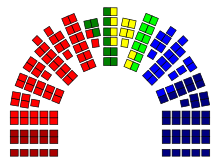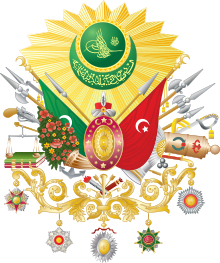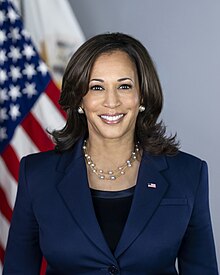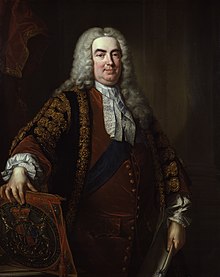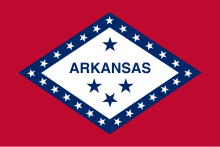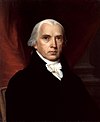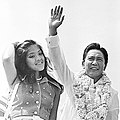Portal:Politics
| Main | Topics and categories | Tasks and projects |
The Politics portal
Politics (from Ancient Greek πολιτικά (politiká) 'affairs of the cities') is the set of activities that are associated with making decisions in groups, or other forms of power relations among individuals, such as the distribution of status or resources. The branch of social science that studies politics and government is referred to as political science.
Politics may be used positively in the context of a "political solution" which is compromising and non-violent, or descriptively as "the art or science of government", but the word often also carries a negative connotation. The concept has been defined in various ways, and different approaches have fundamentally differing views on whether it should be used extensively or in a limited way, empirically or normatively, and on whether conflict or co-operation is more essential to it.
A variety of methods are deployed in politics, which include promoting one's own political views among people, negotiation with other political subjects, making laws, and exercising internal and external force, including warfare against adversaries. Politics is exercised on a wide range of social levels, from clans and tribes of traditional societies, through modern local governments, companies and institutions up to sovereign states, to the international level.
In modern nation states, people often form political parties to represent their ideas. Members of a party often agree to take the same position on many issues and agree to support the same changes to law and the same leaders. An election is usually a competition between different parties.
A political system is a framework which defines acceptable political methods within a society. The history of political thought can be traced back to early antiquity, with seminal works such as Plato's Republic, Aristotle's Politics, Confucius's political manuscripts and Chanakya's Arthashastra. (Full article...)
Selected article
The London Forum is a loose organisation of far-right individuals based in London but with regional headquarters across the United Kingdom. Emerging in 2011 out of a split within the British far-right, meetings were regularly held by the organisation. These have been met with significant protests by anti-fascist activists and have been infiltrated by journalists, most notably a 2015 investigation of the group by The Mail on Sunday with the help of Searchlight, an anti-fascist magazine that focuses on the British far-right.
Featured picture

Andrew Gregg Curtin (1817–1894) was a U.S. lawyer and politician. He served as the 15th Governor of Pennsylvania during the American Civil War. During the Civil War, Curtin organized the Pennsylvania reserves into combat units, and oversaw the construction of the first Union military camp for training militia. After the Battle of Gettysburg, Governor Curtin was the principal force behind the establishment of the National Cemetery there. After serving two terms as governor, Curtin was appointed ambassador to Russia by Ulysses S. Grant, and he later served in the House of Representatives from 1881 until 1887.
Selected quote
Selected biography
Shen Kuo (Chinese: 沈括; 1031–1095) or Shen Gua, courtesy name Cunzhong (存中) and pseudonym Mengqi (now usually given as Mengxi) Weng (夢溪翁), was a Chinese polymath, scientist, and statesman of the Song dynasty (960–1279). Shen was a master in many fields of study including mathematics, optics, and horology. In his career as a civil servant, he became a finance minister, governmental state inspector, head official for the Bureau of Astronomy in the Song court, Assistant Minister of Imperial Hospitality, and also served as an academic chancellor. At court his political allegiance was to the Reformist faction known as the New Policies Group, headed by Chancellor Wang Anshi (1021–1085).
Did you know (auto-generated) -

- ... that Americans received nearly 15 billion political text messages in 2022?
- ... that María Elva Pinckert, motivated by the murder of her brother, started her political career in local politics in 1999?
- ... that Nirmalendu Goon shared his doubts about Sheikh Mujibur Rahman's political decisions during the 1969 East Pakistan mass uprising in his poem Huliya?
- ... that Denpasar mayor I Gusti Ngurah Jaya Negara became active in politics after he was laid off from a bank due to the Asian financial crisis?
- ... that Nigeria's Muslim–Muslim ticket challenges the norm of religious balance in politics?
- ... that the Chinese government began compiling an official history of the Qing dynasty in 2002, but as of 2023 a protracted political review is forestalling its publication?
More did you know...
- ...that the Almanach de Gotha is a directory of European nobility first published in 1763?
- ...that, at a congress in May 1921, all Socialist Party of Romania delegates who supported Bolshevik guidelines were arrested 24 hours after a vote on affiliation to the Comintern?
- ...that Ngo Dinh Diem became president of South Vietnam after a fraudulent 1955 election run by his brother Ngo Dinh Nhu, polling 133% of registered voters in Saigon?
- ...that the Brothers Grimm were amongst the Göttingen Seven, university teachers who protested changes to the constitution of the Kingdom of Hanover in 1837?
- ...that depending on a time and place, the same social movement may be revolutionary or not?
- ...that the Second Malaysia Plan sought to restructure the socioeconomic state of Malaysia through aggressive affirmative action?
In this month
- February 4, 2003 – Yugoslavia was renamed to Serbia and Montenegro converting the federal republic to a looser union.
- February 6, 1911 – Ronald Reagan, 40th President of the United States, was born.
- February 16, 2005 – In the United States, the school board in Staunton, Virginia voted to continue classes in Weekday Religious Education. This was a milestone in the issue of Separation of church and state in the United States.
- February 20, 2005 – Spain approves the European Constitution in a consultative referendum, though with a low turnout of 42%.
News and Current events
- August 11: 4 local government areas in New South Wales, Australia locked down after COVID-19 case
- August 11: Australia: AstraZeneca vaccine access expanded by Victorian government
- August 1: Australia: Victorian lockdown lifted
- July 29: Tunisia's president dismisses prime minister, suspends parliament
- July 25: Australia: Wikinews interviews Reg Kidd, mayor of the City of Orange, about COVID-19 lockdown and local government
- July 23: South Australia enters week-long lockdown to contain COVID-19 Delta variant spread
- July 21: Technological University Dublin senior lecturer Dr Lorcan Sirr speaks to Wikinews on housing market in Ireland
- July 21: Three rural councils in New South Wales, Australia enter 7-day lockdown
- July 21: Australia: Victoria lockdown extended by a week with 85 active cases recorded
- July 15: California governor signs new state budget, eligible Californians to get stimulus payments
Topics and categories
General images
Related portals
Associated Wikimedia
The following Wikimedia Foundation sister projects provide more on this subject:
-
Commons
Free media repository -
Wikibooks
Free textbooks and manuals -
Wikidata
Free knowledge base -
Wikinews
Free-content news -
Wikiquote
Collection of quotations -
Wikisource
Free-content library -
Wikiversity
Free learning tools -
Wiktionary
Dictionary and thesaurus


